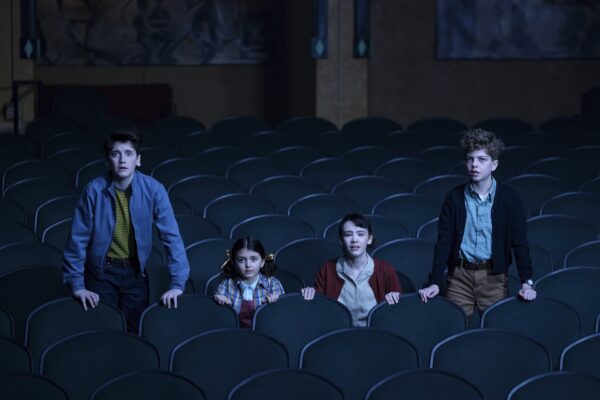
The IT prequel series has arrived on HBO, but before Pennywise (Bill Skarsgård) makes his grand return, Welcome to Derry‘s first episode establishes its storytelling foundation and defies a few expectations. Spoilers follow…
The cheekily titled premiere, “The Pilot”, is directed by Andy Muschietti and written by Jason Fuchs, both of whom were involved in bringing IT to the big screen in 2017 and 2019.
HBO’s eight episode season is set in Stephen King’s fictional Maine town of Derry in 1962 and follows a group of pre-teens who gather to try and solve the mystery of their missing friend. “The Pilot” also features two stand-out action sequences, the first of which involves Matty (Miles Ekhardt) being chased out of the Capitol movie theater and hitching a ride home in the wrong car.
This opening ~10.5 minute sequence is a solid way to kick off the series. We don’t get a great sense of Derry as a corrupted town (which is a principal theme of both the book and the films), though Matty is clearly being picked on by the usher in part because he’s poor (His face is also clearly bruised, suggesting that the boy is fleeing from a domestic abuse situation).
The sequence in the car that follows is appropriately harrowing and slightly disorienting. Muschietti knows how to stage the action so that the tension ratchets up in slow, unnerving increments (spelling is scary. Who knew?!)
Would it have been nice to get a better sense of what the winged baby demon does to Matty? Sure, but at least the CGI creature looks decent (much better than the pacifier flying through the air into a familiar river, which was last glimpsed in Chapter 2).
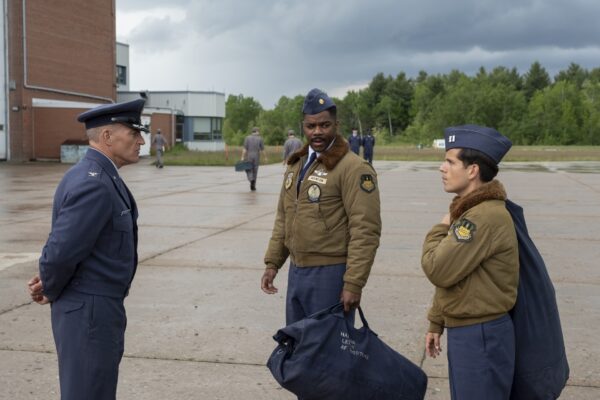
The rest of the episode lays a lot of groundwork as the series introduces its sprawling cast of characters. First up: we have the decorated Korean war vets Captain Pauly Russo (Rudy Mancuso) and Major Leroy Hanlon (Jovan Adepo). The latter is immediately met with barely concealed racism from an underling named Masters and is later attacked in the barracks at night by a trio of gas mask wearing men.
The acknowledgement of Derry’s racism (and the prominent role afforded Adepo) suggests Welcome to Derry will right a pretty significant wrong from Muschietti’s film adaptations. Obviously Mike Hanlon (played in the films by Isaiah Mustafa and Chosen Jacobs, respectively) is Leroy’s son, so this is deliberate connective tissue to bridge the two texts, but the focus on Hanlon senior also infers that the racist backstory hinted at in the films will be expanded and elaborated on here.
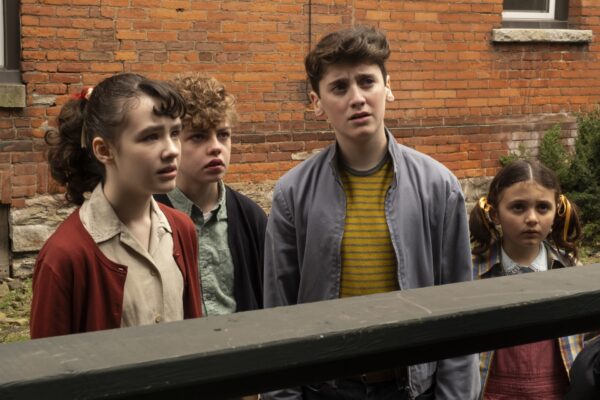
Then there is the crop of new teen characters. Pennywise famously loves to snack on youngsters, so it makes sense to populate the show with high school students. Initially, though, it appears as if the creative team has made a fatal error by sticking so closely to the character breakdown of King’s novel and the Losers we already know. By episode’s end, however, that will prove to be a very deliberate (and, I would argue, successful) strategy.
“The Pilot” spends most of its time introducing Beverly-coded “Loony” Lily Bainbridge (Clara Stack), her best friend Marge (Mathilda Lawler), jokester cracking, Ritchie-coded Phil (Jack Molloy), Jewish Eddie-coded Teddy (Mikkal Karim-Fidler) and wise Ronnie (Amanda Christine), the lone racialized teen character (so Mike-coded).
Save for Ronnie, all of the others have ties to Matty, who has been missing and presumed dead for four months when the action picks back up in April 1962. Lily, Phil, and Teddy all have reason to feel guilty about the way they treated Matty before he disappeared, and this first episode does a good job of introducing them as unique characters before bringing them together as an ensemble. Still, it’s hard not to feel like this is merely an abridged version of the journey that we’ve already seen another generation of Losers undertake.
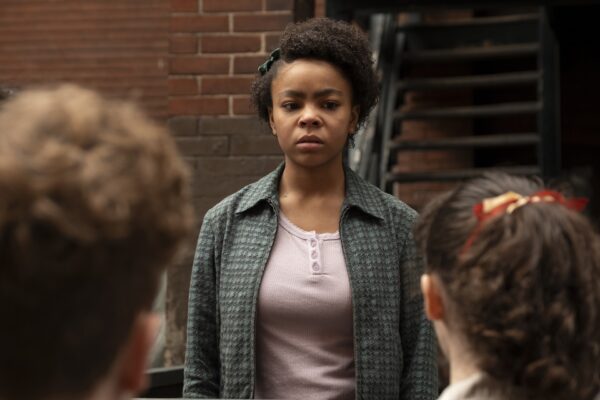
Which is why <spoilers> it is so impactful that IT: Welcome to Derry dispenses with all of them except Lily and Ronnie in the premiere’s climactic action set piece. It feels brazen and subversive to invest nearly an entire episode on these characters only to brutally slaughter them when the winged demon baby returns.
It’s both smart and daring of Fuchs and Muschietti, but also necessary. Up until this point, the climax suffered from pretty significant deja-vu vibes. As effective as it is to see Matty imprisoned as an extra in The Musical Man in front of his baffled friends, we’ve seen this visual before (from this very creative team, no less!)
So kudos to IT: Welcome to Derry for pulling the rug out from under its audience after lulling us into a false sense of “been there, done that.” Add to this the fact that we’re not just killing teenagers, but also pre-teens. RIP Phil’s younger sister, Suze (Mathilda Legault).
With this exciting set piece, the series’ stakes have now been properly established. It is unclear if the remainder of Welcome to Derry can match or exceed this level of nihilism, but the mixture of familiar King-isms, the stylish (and expensive) looking production values, and the willingness to subvert expectations has kicked off the series on a high.
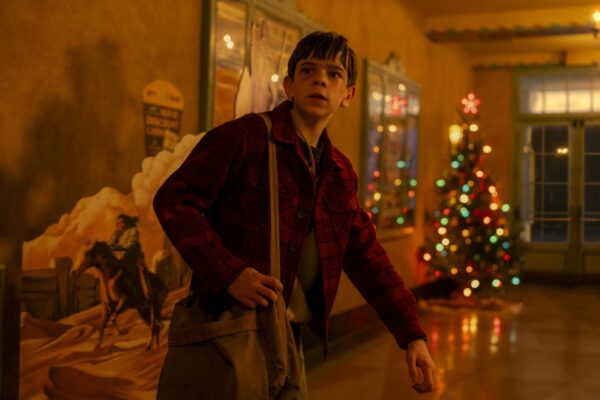
Other Observations:
- Having never seen The Music Man, I need to ask: is it actually as bizarre as it is portrayed here? For the purposes of the show, hyperventilating adults worried about the moral decline of the town’s youth might be a little heavy handed thematically, but the selective use of “Trouble” proved to be effective.
- The racist attack on Hanlon was obviously orchestrated by Masters as retaliation, right? As soon as
General Shaw (James Remar) mentioned that Masters was punished for his obstinance, it was clear Hanlon would pay the price. - I don’t believe he’s actually named, but Shaw’s driver (Chris Chalk) is playing The Shining‘s Dick Halloran. I’m not sure how to feel about introducing such an iconic character from another title (as someone who isn’t a huge fan of King, I’m unaware of how much – if any – cross-over there really is between the two novels). We’ll have to wait to see how this pans out.
- Due to the time period, there’s a significant subplot about how the world is on the cusp of WWIII, including the fact that the DAFB base (with its Checkov’s Special Projects building) is “the tip of the spear in nuclear defence.” Presumably none of this will come into play later in the season. 😉
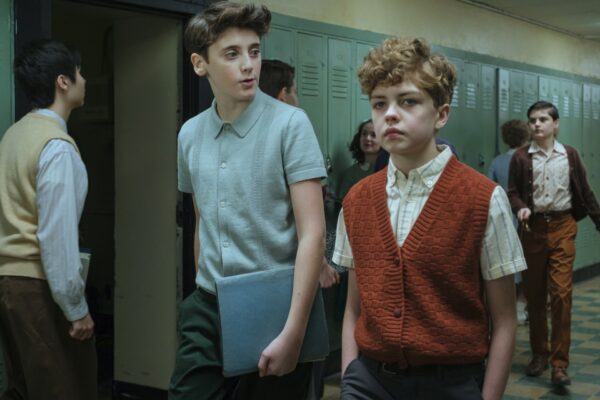
- The story about Lily’s father dying in a pickle jarring accident is properly horrifying, so it’s only natural that she would be made fun of for it at school.
- Also: I appreciate that her mother would feel a certain way about Lily not visiting her father’s grave for a year, but suggesting that she’s “not the only one who’s had something terrible happen to them” isn’t exactly helpful. Bad mom alert!
- In comparison, Ronnie’s father, who owns the Capitol, doesn’t care about Matty sneaking in and allows his daughter to lie about the boy’s whereabouts. Good dad alert!
- I’m of two minds about the tongue-in-cheek references that seem to exist specifically as a wink for audiences. Case in point: is it cute or eye-rolling for Hanlon to be told “If normal is what you two are after, you’re going to love Derry.” I’m gently leaning towards the latter.
- Multiple references to turtles is *clearly* meant to evoke Maturin. Here we get both the high school’s mascot Bert, as well as the charm bracelet figure that Matty gives Lily before his disappearance.
- Considering the ire that Ian Brennan’s third season of Monster: The Ed Gein Story just earned, it’s a bit wild to see (and hear of) a lampshade made of human skin during Teddy’s scenes.
- Full confession: Schwoopy hair notwithstanding, I found Phil to be a grating character so I’m not sad he’s gone. With that said, his line during the climax “They made a giant fucking mutant baby!” did earn a chuckle.
- Finally, bonus points to the show for not only killing a child, but also leaving Lily holding her amputated hand. Good stuff!
IT: Welcome to Derry airs Sundays on HBO